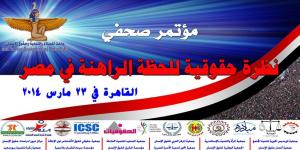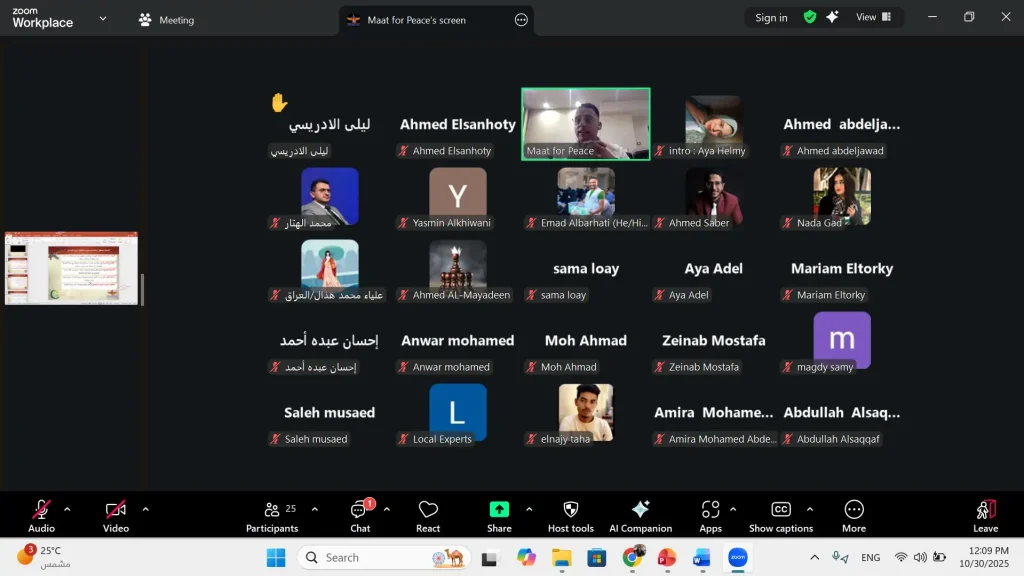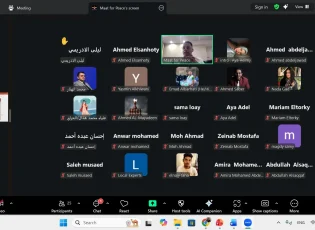Maat Foundation for Peace, Development and Human Rights held a conference today, Sunday, March 23, 2014, under the umbrella of the Civil Society Organizations Coalition called for by Maat, which includes 25 organizations, with the aim of assessing the human rights situation in Egypt during the period The past period of transition and the performance of national and non-governmental human rights institutions during this period.
The conference coincides with the preparations of Egyptian civil society organizations to participate in the procedures for Egypt's submission to the universal periodic review mechanism for the human rights situation, scheduled for October 2014, as the coalition finished preparing and sending two reports on the human rights situation to the Office of the High Commissioner for Human Rights.
Mr. Mukhtar Noah, the lawyer in the court of cassation and a member of the National Council for Human Rights, and Mr. Salah Suleiman: President of the Association of the Captain - the lawyer in the cassation, and Ms. Iman Embabi: Assistant Editor-in-Chief of Al-Ahram, as well as a large number of media professionals, activists and human rights workers
At the opening of the conference, Ayman Aqil, the head of the Maat Foundation and the coordinator of the Alliance, stressed that the community dialogue, transparency and honest assessment of the human rights situation in the Egyptian society at the current moment is the cornerstone of the process of improving the human rights situation, indicating that the conference comes at a "moment" in which the political movement reaches its extent And it comes in light of a state of political polarization, societal problems, and differences in the evaluation of human rights and public freedoms post-July 3, 2013.
The conference witnessed severe reservations about the human rights performance during the last stage, especially the performance of the National Council for Human Rights as the official national institution, especially since the conference came after the Council issued its report on the fact-finding process for the dispersal of the Rab'a sit-in.
Where the great lawyer Mukhtar Noah, a member of the Council, expressed his strong dissatisfaction with the report of the Council, revealing that the report was not presented to all the members of the Council, describing the report as “a sin and not a major sin” as he described it, explaining that the report included many inaccuracies and gross errors that challenge His credibility, and expressed his astonishment at what the report concluded, that the killing of the officer who calls the loudspeaker to guide the protesters on the safe passage does not justify the use of force by the police.
Noah wished that the controversy surrounding this report would be the beginning of the Council reforming its mistakes and modifying its course to attract independent and impartial human rights figures.
Human rights activist Salah Suleiman also revealed that the final report of the council differs from the draft that was presented, indicating that there are amendments made to it during the interval under pressure from some political forces, which makes the report inaccurate in describing the process of dispersing the sit-in, denying the characteristic of the sit-in. Peaceful from its inception.
In the same context, Professor Iman Mbabi, assistant editor-in-chief of Al-Ahram, revealed that the report exceeded some media-documented facts and was not credible, noting that there are published videos that contradict the conclusion of the Council's report, and some of the activists' participants also showed a video showing armed elements taking control of the corridor. Safe to prevent sit-ins from using it and pushing the police to attack, thus causing casualties among the protesters
Some participants also expressed their questions related to some human rights entities that are moving in a direction that contradicts the honest description of what is happening in Egypt, as they indicated the lack of clarity of the legal status of these entities and the lack of transparency in announcing the sources of financing their activities, while acknowledging the right of organizations to receive legitimate funding. However, announcing it must be clear to see how independent these organizations are indeed.
The conference witnessed some activists presenting an initiative to establish a parallel human rights council that expresses the Egyptians and defends their rights after the council proved its “failure as far as they described,” noting that some members of the council receive salaries of up to seven thousand pounds per session from the pockets of taxpayers without participating At meetings.
The conference also witnessed the announcement of a summary of the most important aspects of the reports of the coalition of civil society organizations that were sent to the Office of the High Commissioner for Human Rights, which revealed severe negative changes at the political, economic and social level, most of them resulting from the failure of economic and social development policies and the failure of government interventions, which significantly affected the degree of Fulfilling the political, economic and social rights of Egyptian citizens.
It is worth noting that the reports will be published in detail for public opinion soon.
shortlink: https://maatpeace.org/en/?p=29715












